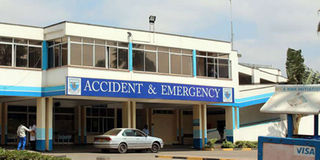KNH fiasco underpins need for better patient safety mechanism

Kenyatta National Hospital. I received antagonistic, grossly exaggerated and outrightly untruthful versions of the story with different themes and many hilarious WhatsApp memes in the usual Kenyan fashion of being judge, jury and executioner without knowing the facts of the case. FILE PHOTO | NATION MEDIA GROUP
What you need to know:
What is forthcoming is that a patient wrongly underwent brain surgery, putting him at risk of the delicate operation.
In medical parlance, an occurrence as the KNH one is known as a “never event” — meaning that such errors should never take place.
Improved perioperative care translates to systems — which means manpower and technology and other resources.
The past few weeks have seen a public indictment of the medical profession following a mix-up of patients in the surgical unit of the Kenyatta National Hospital.
I received antagonistic, grossly exaggerated and outrightly untruthful versions of the story with different themes and many hilarious WhatsApp memes in the usual Kenyan fashion of being judge, jury and executioner without knowing the facts of the case.
What is forthcoming is that a patient wrongly underwent brain surgery, putting him at risk of the delicate operation and subsequent interventions, while delaying treatment for the one meant to be operated on.
It is imperative that the concerned workers, whether medical or administrative, be held to account as per the law.
CHORUS OF HORROR
Initially, Kenyans were united in a chorus of horror and condemnation of the incident but the trajectory took a political and tribal tangent.
Never mind that when doctors went on strike to push for an improved healthcare system — leading to the jailing of union officials — this public did not elicit a similarly enthusiastic response towards the cause.
On the contrary, the medics were branded as selfish and truant to the Hippocratic Oath.
In the face of poor multidisciplinary relationships, underfunding, insufficient manpower with overwhelming burnout and lack of proper patient safety mechanisms, one wonders why there is so much surprise and furore at the case.
'NEVER EVENT'
In medical parlance, an occurrence as the KNH one is known as a “never event” — meaning that such errors should never take place — and is usually serious, largely preventable and of concern to both the public and healthcare providers. The term is, unfortunately, a misnomer because they actually do occur.
Such an event is, nonetheless, so rare that the “never event” list by The Leapfrog group actually includes wrong site surgery rather than wrong patient.
TWICE LIKELY TO DIE
Research by the University of Cape Town in 247 hospitals in 25 countries, published in The Lancet last year, showed that patients undergoing elective surgery in Africa were twice likely than the global average to die after the operation.
The study pointed to insufficient medical staff, resulting in difficulties spotting or tackling complications after operations. Medical errors are increasingly being recognised as a problem, with a study by Johns Hopkins Medicine researchers published in 2016, and analysed by The British Medical Journal placing them as the third-leading cause of death in the United States after heart disease and cancer.
It is for such reasons that the six international patient safety goals were introduced.
Also, the 68th World Health Assembly, in Geneva in 2015, unanimously passed Resolution 68:15 to strengthen emergency and essential surgical care and anaesthesia. This gave birth to the World Health Organisation (WHO) Global initiative for Emergency and Essential Surgical Care (GIEESC).
Having rotated in KNH during my postgraduate surgical training, I noticed many hardworking staff, who put in long hours and dedicated service while expecting (and receiving) little or no appreciation.
I have also been in surgical departments during my medical training globally.
The difference in outcomes is not in knowledge and skills. Research proves that the less-than-impressive mortality and morbidity outcomes in the developing countries may be due to suboptimal perioperative care.
This is the management of patients from the first time they are seen in the clinical area to the time of follow-up in postoperative clinics.
Improved perioperative care translates to systems — which means manpower and technology and other resources.
That means money. If we don’t increase healthcare funding, then “never events” will become more frequent in our hospitals.
Dr Kobe, a Kenyan-registered general surgeon, is a surgical training fellow in the United Kingdom. [email protected]




